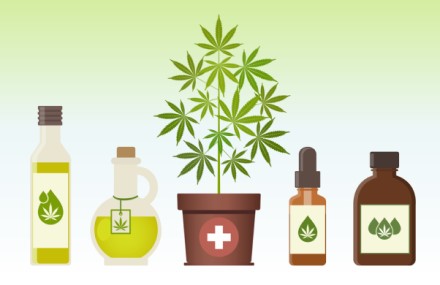Cannibidiol, or CBD oil, has exploded to the forefront of alternative medicine in recent years. It is a “cannibinoid”, being a cannabis-derived compound whose group also includes THC. While THC gives a feeling of being “high”, CBD oil does not have pyschoactive effects, meaning that it will not impair your cognitive functions. This makes it an attractive alternative for anyone who wants the benefits ascribed to cannabis, but doesn’t want to be high or in violation of drug laws.
Consumers and vendors alike list an impressive array of conditions that can be treated with CBD oil, including acid reflux. But with so many singing its praises both online and in person, can CBD oil really “do it all”, including treat acid reflux? Before we get into the abilities of CBD oil, let’s first discuss what acid reflux is and what causes it.
The human digestive tract is comprised of a series of areas that have the ability to chamber themselves off from one another using a series of muscles called “sphincters”. There are six sphincters in the human digestive tract, and their contraction and relaxation is key to ensuring that both the food we eat and the waste we produce stay where they ought to be in their respective “chambered” areas. The sphincter muscles of the digestive tract relax to allow food or waste to pass through, and contract in order to prevent contents of a “chamber” from escaping in the wrong direction – backwards, for example. If the muscles of a given sphincter aren’t able to contract correctly, back flow can occur, leading to some less-than-pleasant symptoms.
A person suffering from acid reflux is already familiar with the sensation of one of those sphincters failing – specifically the LES, or Lower Esophageal Sphincter. The LES separates the esophagus from the stomach, and when it’s working correctly, it prevents food and stomach acid from backwashing into the esophagus. When the LES isn’t working correctly, stomach acid and food can make their way back from whence they came, creating a burning sensation in the chest and throat. Et voila: heartburn, or acid reflux.
CBD and Acid Reflux

With the above in mind, the let’s focus on two of the main benefits attributed to CBD oil when using it to treat acid reflux:
- Soothing tissue irritation associated with acid frequently coming into contact with the throat
- Regulating TLESRs (Transient Lower Esophageal Sphincter Relaxations) to prevent the LES from allowing stomach acid to enter the esophagus
CBD oil is often said to be an effective treatment for pain, and studies using animals as test subjects have shown that cannibinoids do appear to have an analgesic effect. Studies with human subjects suffering from chronic pain conditions, however, have not shown as much evidence for effectiveness — further studies are recommended on the subject.
Still, there are many thousands of stories from CBD oil consumers touting the benefits of CBD oil as a pain-reliever and anti-inflammatory agent. While there are no conclusive studies demonstrating CBD oil to be an effective pain-reliever on human subjects, cannibinoids are known to have powerful anti-inflammatory properties. So while CBD oil might not necessarily offer pain relief, it has the potential to act as an anti-inflammatory to soothe throats burned by stomach acid, which one might consider to be just as good as a proven pain-reliever.
CBD oil is also often cited as having anti-spasmodic properties, and so is thought to be useful in regulating Transient Lower Esophageal Sphincter Relaxations. The idea is that if the muscle is contracting or relaxing incorrectly, then stomach acid can enter the esophagus and cause damage to the tissues there. While “anti-spasmodic” in this context may not be the best descriptor, the cannibinoid Delta-9 THC was shown to regulate TLESR activity in human test subjects. It must be noted, however, that the attraction of CBD oil is its lack of THC, and while THC has been shown to have a positive effect on reducing the muscle relaxations that contribute to acid reflux, further studies are recommended in its – and any cannibinoid’s – efficacy on this matter.
There are endless pages of anecdotal evidence online as to the cure-all properties of CBD oil, and while some of it does indeed seem promising, there is still a need for additional research into CBD oil’s actual benefits. Before you make the leap into a CBD oil regimen, research the studies conducted on it and look into the vendors offering the product to be sure you’re receiving what they say you are. Most importantly, talk to your doctor about your treatment options. The choice of how to treat your acid reflux is ultimately yours; just make sure it’s a healthy one.
Resources:
“Review: The Role of Cannabinoids on Esophageal Function—What We Know Thus Far”
“Cannabinoids as novel anti-inflammatory drugs”
“Cannabidiol (CBD) — what we know and what we don’t”
“What are the benefits of CBD — and is it safe to use?”
“Despite hemp legalization, FDA will still consider CBD products largely illegal”
“Thirty-Ninth meeting of the Expert Committee on Drug Dependence”
